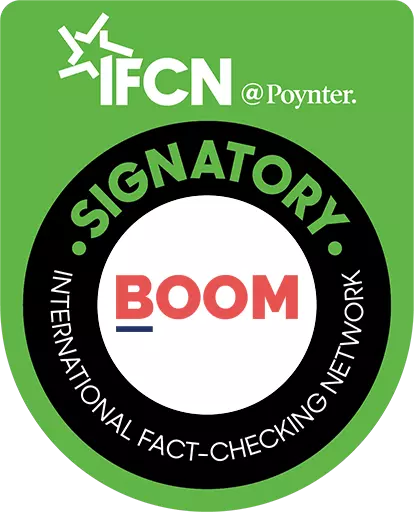BOOM is an independent digital journalism initiative with a mission to fight misinformation and make the internet safer.
Our Journey
Founded in India, we are a premier fact checking website, committed to bring to our readers verified facts rather than opinion. BOOM also writes pro-active fact files which serve to educate readers on key issues they might have questions about. Subjects that BOOM actively fact checks range from political, social, communal and health & medicine to products and services and even history.
Starting March 29, we have launched fact checking operations in Myanmar with an experienced local team leading the initiative.
Our approach involves a whole bunch of simple technology and tools but the foundation of our work is journalism, classic, old-school and robust. We speak to people, we check and verify and do not publish until and unless we have got formal clarifications on posts or stories where individuals and organisations are involved.
Before launching in Myanmar, BOOM has been running a newsroom handling three languages, English, Hindi and Bengali with dedicated on ground teams working on all three. BOOM also broadcasts daily on Facebook and YouTube with live updates and checks on the latest news material being worked upon.
We can be found on Twitter (@BoomMyanmar) and on Facebook.
We were the first fact checker to launch a WhatsApp helpline where you can send in your posts & forwards to be fact checked.
BOOM has been in existence since 2014 as a broad investigative journalism effort and as a full-fledged fake news busting and fact checking initiative since November 2016. BOOM is a part of Outcue Media Pvt Ltd and is based in Mumbai, India.
International Certification
BOOM is among the first two fact checkers in India (www.factchecker.in also launched by the same founder) and South Asia to be certified by the International Fact Checking Network- Poynter Institute. This certification is a reflection of the early steps we took to build a editorially strong independent fact checking website that has strived to debunk fake news and prevent the spread of it.
Methodology:
1. Select a claim to fact check:
We actively monitor news while keeping an eye on social media, especially public statements of politicians and people in position of authority. We also have a WhatsApp hotline number where readers can send us messages that are viral and need to be fact checked. In addition we also get tagged on Twitter and Facebook by our readers to fact check claims. The claim is selected based on a number of factors for example, is it newsworthy? Does it impact a large number of people? Is the content provocative or sensitive and could potentially cause harm if left unchecked?
2. Trace the source of the claim:
Once we have zeroed in on a claim to fact check, we then look for where the claim originated. Often the source is a crucial starting point in establishing whether a claim is trustworthy or not. For example in case of news stories, we first determine if it is from a reliable site. In case of pictures, we use Google’s Reverse Image Search to decipher whether the image is old or if it has been manipulated in any way or used out of context. In case of single source claims and eye-witness accounts we try to determine if the person making the claim could have access to such information.
3. Contact the source:In case of claims involving public figures, we reach out to the person concerned or their office to understand their side of the story. We also look for video evidence or publically available transcripts to ascertain what exactly was said and in what context. In case of reports or data points, we contact organisations that have published the reports to understand the context and disclaimers if any.
4. Look for evidence and data to support or knock down a claim:We look for all publically available resources on the topic including sifting through material previously written on the subject. We search for data within government databases, global think tanks, research firms and other trustworthy sources that could support or debunk a claim. In case we are unable to find data we openly say so.
5. Speak to experts/people in the know:
BOOM does not claim to have expertise on every topic under the sun. More often than not we rely on the knowledge of experts in a particular field. We try and avoid source based stories as far as possible and only quote those who are willing to speak on record.
6. Write a fact check:
We write our stories based on the steps detailed above. We provide links to the sources referred to in our stories. In instances where we are unable to prove or disprove a claim we explicitly say so and list all the steps we have followed.
7. We correct mistakes promptly and openly
BOOM is committed to debunking fake news on a real-time basis. We acknowledge that sometimes we might get it wrong. When we do go wrong, we do not shy away from our mistakes but correct our story promptly and inform our readers about the correction. Stories that have been corrected contain an advisory. BOOM is active on social media platforms such as Twitter and Facebook. We are open to constructive feedback and criticism.





